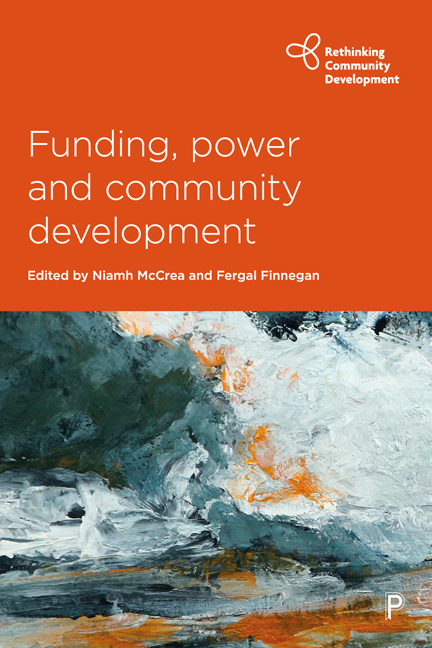Book contents
- Frontmatter
- Contents
- Series editors’ preface: Rethinking Community Development
- Acknowledgements
- Abbreviations
- Notes on contributors
- One Funding, power and community development: an introduction
- PART 1 New configurations of power and governance
- PART 2 Questions of state and grassroots democracy
- PART 3 Modes of agency and horizons of possibility
- Index
Eleven - Communities of hope? Gendered re-signification of microcredit in rural India
Published online by Cambridge University Press: 19 April 2022
- Frontmatter
- Contents
- Series editors’ preface: Rethinking Community Development
- Acknowledgements
- Abbreviations
- Notes on contributors
- One Funding, power and community development: an introduction
- PART 1 New configurations of power and governance
- PART 2 Questions of state and grassroots democracy
- PART 3 Modes of agency and horizons of possibility
- Index
Summary
Introduction
The international development establishment is currently preoccupied with discussions of resilience – trying to measure what the world's poor are doing in concrete ways to make life habitable under conditions of intense precarity (Khapung, 2016). The discussion of resilience dovetails quite well with the celebratory narratives of market-based community development initiatives which seek to tap into women's creativity and embolden such efforts (Karim, 2011; Sen, 2017). In the 1990s, Western donor agencies in conjunction with the Consultative Group to Assist the Poorest (C-GAP) identified microfinance, the practice of lending small amounts of money to poor households without collaterals, as ‘a major donor plank for poverty alleviation and gender strategies’ (Karim, 2011: xiv). The first Microcredit Summit at Washington, DC in 1997 presented research in favour of microcredit, identifying it almost as a silver bullet – both profitable and sustainable – unleashing the entrepreneurial power of poor women in the Global South and, in the process, empowering them. In India about 13 million (Morris, 2012) people have taken microcredit-based loans. However, critiques of microcredit as a solution to poverty have been growing, and more recently microcredit has been blamed for rural suicides among loan takers (Associated Press, 2012).
In this context, this chapter presents a picture of what gendered resilience looks like at the ground level in eastern India's Darjeeling district in the state of West Bengal. Our particular focus is how women interpret and react to popular market-based development alternatives like microcredit and the consequences this has had for community development. We contend that:
1. women in Darjeeling's poorest villages have developed a very different understanding of risk – what they term riks – than the more narrowly focused ‘risky economic behaviour’ discussed by microcredit and development NGOs;
2. these different interpretations of credit and risk reveal the situated nature of economic practices and highlight the deep connection between inter- and intra-household power inequalities; and
3. that the women have responded to this situation by demonstrating creative collective social agency that in turn has had noteworthy unintended consequences on them and their community. In other words, the practice of microcredit is deeply embedded in the social and cultural context in which the women were living.
- Type
- Chapter
- Information
- Funding, Power and Community Development , pp. 163 - 176Publisher: Bristol University PressPrint publication year: 2019

